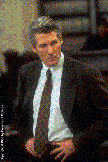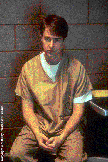Primal Fear
Indefensible
When a beloved archbishop is brutally murdered, the only suspect is 19-year old altar boy Aaron Stampler (Edward Norton), caught shivering in a railroad yard, still drenched with the victim's blood. Racing to the scene is flamboyant defense attorney Martin Vail, who eagerly takes the case for the fame alone. Stampler admits to being in the room, but says that someone else did the crime - he can't remember details because he suffers from occasional blackouts. Vail hires a psychologist (Frances McDormand, most recently starring in Fargo) to examine his client, and she determines the cause of his blackouts.
Sometime during the 1980s, lawyers supplanted private eyes as the primary heroes of pulp fiction. The origins of the lawyer hero can be traced back at least as far as Mark Twain, but took complete form in 1933, with the appearance of Perry Mason in Earle Stanley Gardner's mystery novel The Case of the Velvet Claws. The Mason character was initially just another variation of the private eye type, not above breaking the law in pursuit of a larger good now and then. But Gardner was quick to catch on to the dramatic possibilities inherent in courtroom situations, and Mason mined that vein throughout a run of eighty popular novels.
With the decline of the pulps, Mason took on a more serious image, personified perfectly by Raymond Burr on television, but the earlier Mason was a sensation-seeking glory hound, his antics showing up as often in the gossip columns as on the front page. However, we occasionally get a glimpse of serious dedication to justice lurking beneath his tough exterior. This Mason was perfectly played by Warren William in a series of films in the 1930s.
Vail, as played by Richard Gere, is such a direct swipe from this early version of Mason that I'm surprised there have been no lawsuits from the Gardner estate. Vail is a bright, handsome man who adores the spotlight of big, media-driven trials. He's assisted by a loyal, beautiful secretary (Maura Tierney of TV's NewsRadio), and a tough detective (Glory's Andre Braugher). At least the plot of Primal Fear doesn't have a Hamilton Burger clone as Vail's courtroom opponent. Instead, it has characters familiar from other lawyer movies - there's beautiful, high-strung prosecutor Janet Venable (Laura Linney, seen last year dodging lava and killer mutant apes in Congo), who has had a love/hate relationship with Vail since the end of their - as she describes it - "six month one-night stand. Then there's sexist, corrupt, cranky old State's Attorney John Shaughnessy (John Mahoney of TV's Frasier), who was Vail's mentor until he was asked to do A Bad Thing. The trial is even presided over by Alfre Woodard, who seems to be always playing lawyers and judges.
Actually, despite the familiar characters and situations, it all plays pretty well for the most part. The script by Steve Shagan and Ann Biderman contains plenty of entertaining scenes, and director Gregory Hoblit (who also chaired Roe Vs. Wade) does a fine job of keeping things moving. Rather than the highly improbable courtroom antics that so often plague these pictures, long hours of procedure are cut together sharply - digesting them into snappy, rhythmic sequences that go down easy. And none of the performances are really bad, it's just that the casting could have been a bit more imaginative.
In fact, I was so entertained by all the characters rushing about the Chicago locations in search of the next plot twist that I nearly forgot that it basically doesn't make much sense - a perfect example of a cinematic house of cards - until the totally preposterous "surprise" ending. I'm not feeling mean enough to give it away to those of you that can't guess the answer by the brief synopses above (you can e-mail me for a rundown of the plot holes), but let me just say that it combines elements of Psycho and at least one episode of LA Law. It's one of those movies where you guess the ending within the first twenty minutes, only to discard it because it's too stupid - at which point you let yourself get caught up in the story, assured that a more sensible solution will be forthcoming. the Chicago locations in search of the next plot twist that I nearly forgot that it basically doesn't make much sense - a perfect example of a cinematic house of cards - until the totally preposterous "surprise" ending. I'm not feeling mean enough to give it away to those of you that can't guess the answer by the brief synopses above (you can e-mail me for a rundown of the plot holes), but let me just say that it combines elements of Psycho and at least one episode of LA Law. It's one of those movies where you guess the ending within the first twenty minutes, only to discard it because it's too stupid - at which point you let yourself get caught up in the story, assured that a more sensible solution will be forthcoming.
I should have been tipped off by the title, which makes no sense whatsoever in relation to the story. One may expect an arcade game pitting Gere in a courtroom battle with a big dinosaur.
I don't know where to lay the blame for this absurdity - since I haven't read the original novel by William Diehl, I can't say that liberties were taken with the story, but I suspect that's where the story's deficiencies began. A glance at Diehl's bibliography shows him to be a dabbler, turning out a cop novel here, a spy novel there, using the established elements of any established "paperback best-seller" category that seems likely to move units.
I've got nothing against the concept of an attorney hero. Contrary to popular opinion, I don't believe that all lawyers are demons in suits. In one fairly decent scene, a drunken Vail explains to the reporter that's doing a story on him that, though he loves the money and attention his work brings him, it's really his love for the concepts laid down in the Bill of Rights that motivates him. This may be true of more members of the bar than even they would like to admit. In fact, my grandfather was a lawyer (who actually resembled Raymond Burr quite a bit). He taught me at an early age the importance of rational thought and logic in dealing with even the most emotionally charged situations, and how careful analysis can often resolve any difficult matter. These lessons served me well in my deliberation with Primal Fear.
Visit the Paramount Primal Fear website.
Front Page || Movie Madness
Copyright © 1994-1997 by Virtual Press/Global Internet Solutions. Internet Daily
News and its respective columns are trademarks of Virtual Press/Global Internet Solutions.
|
 Written by Brian Thomas
Written by Brian Thomas
 Written by Brian Thomas
Written by Brian Thomas